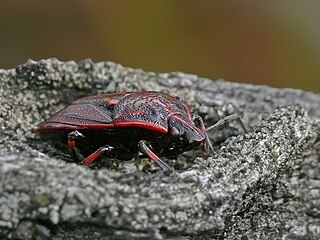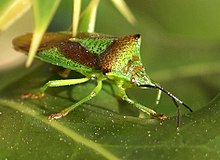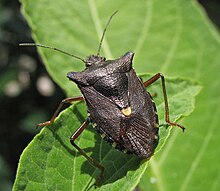
Pentatomidae is a family of insects belonging to the order Hemiptera, generally called shield bugs or stink bugs. Pentatomidae is the largest family in the superfamily Pentatomoidea, and contains around 900 genera and over 4700 species. As hemipterans, the pentatomids have piercing sucking mouthparts, and most are phytophagous, including several species which are severe pests on agricultural crops. However, some species, particularly in the subfamily Asopinae, are predatory and may be considered beneficial.

Scutelleridae is a family of true bugs. They are commonly known as jewel bugs or metallic shield bugs due to their often brilliant coloration. With the name based on the Asian genus Scutellera, they are also known as shield-backed bugs due to the enlargement of the thoracic scutellum into a continuous shield over the abdomen and wings. This latter characteristic distinguishes them from most other families within Heteroptera, and may lead to misidentification as a beetle rather than a bug. These insects feed on plant juices from a variety of different species, including some commercial crops. Closely related to stink bugs, they may also produce an offensive odour when disturbed. There are around 450 species worldwide.

The forest bug or red-legged shieldbug is a species of shield bug in the family Pentatomidae, commonly found in most of Europe. It inhabits forests, woodlands, orchards, and gardens.

Acanthosomatidae is a family of Hemiptera, commonly named "shield bugs" or "stink bugs". Kumar in his 1974 world revision recognized 47 genera; now this number is 55 genera, with about 200 species, and it is one of the least diverse families within Pentatomoidea. The Acanthosomatidae species are found throughout the world, being most abundant in high-latitude temperate regions and in subtropical regions at high altitudes.

The green shield bug is a Palearctic shield bug species in the family Pentatomidae. The name might equally apply to several other species in the tribe Nezarini, or if referred-to as a "green stink bug", it might more appropriately belong to the larger North American bug, Chinavia hilaris. The adult green shield bug ranges in the colour of their backs from bright green to bronze, without any substantial markings. Green shield bugs are a very common shield bug throughout Europe, including the British Isles, and are found in a large variety of habitats, including gardens. They have been found as far north as 63° N latitude.

The hawthorn shield bug is a common European shield bug. Its chief food is haws, the fruit of the hawthorn tree, but adults can overwinter on a diet of leaves, and individuals can be found on many potential food plants, including pedunculate oak, sessile oak and whitebeam. They may grow up to 17 mm (0.67 in) long, and are camouflaged in shades of green and brown. Like many so-called "stink bugs", they may release unpleasant odours when disturbed.

Troilus luridus, also known as the bronze shieldbug, is a species of shield bug found in Europe. It was first described by the Danish zoologist Johan Christian Fabricius in 1775. Shieldbugs are generally phytophagous and some, including Troilus luridus, are also carnivorous and will eat the larvae of beetles, lepidoptera and sawflies.

Picromerus bidens, the spiny shieldbug or spiked shieldbug, is a carnivorous species of shield bug in the family Pentatomidae.

Eurydema ornata is a species of shield bug in the family Pentatomidae.

Eurydema oleracea is a species of shield bug in the family Pentatomidae and is commonly known as the rape bug, the crucifer shield bug, the cabbage bug or the brassica bug.

Tritomegas bicolor, the pied shield bug, is a species of burrowing bug found in Europe. The adult is black and white and 5.5–7 mm (0.22–0.28 in) long.
In the 10th edition of Systema Naturae, Carl Linnaeus classified the arthropods, including insects, arachnids and crustaceans, among his class "Insecta". True bugs and thrips were brought together under the name Hemiptera.

Stagonomus venustissimus, common name woundwort shieldbug, is a species of shieldbug belonging to the family Pentatomidae, subfamily Pentatominae.

Eurygaster is a genus of shield bugs, typical of the subfamily Eurygastrinae and tribe Eurygastrini, widespread in Eurasia, with some species in North America. At least two species are considered economically important sunn pests.

Tritomegas is a genus of shield bugs.

Piezodorus lituratus, the gorse shield bug, is a species of Pentatomidae, a family of shield bugs.

Jalla is a genus of European shield bugs in the subfamily Asopinae erected by Carl Wilhelm Hahn in 1832. The type species Jalla dumosa is recorded from northern Europe including the British Isles.



















